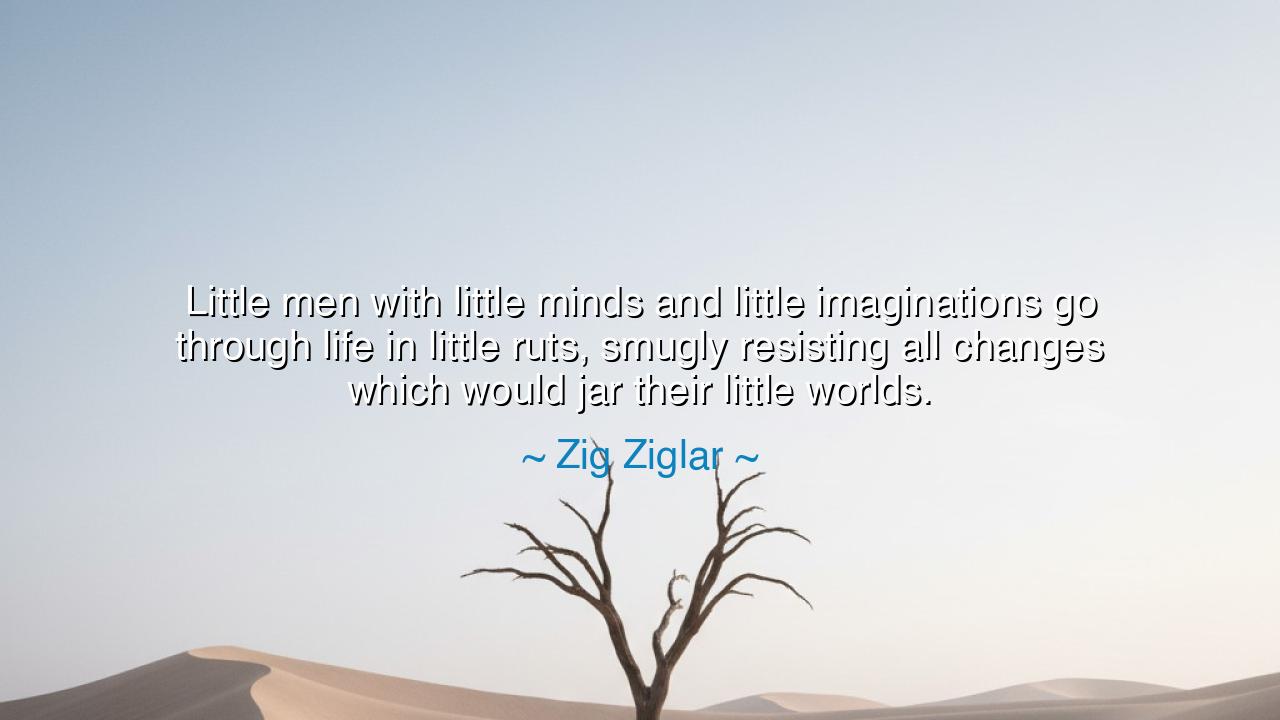
Little men with little minds and little imaginations go through
Little men with little minds and little imaginations go through life in little ruts, smugly resisting all changes which would jar their little worlds.






Hear the piercing words of Zig Ziglar, who declared: “Little men with little minds and little imaginations go through life in little ruts, smugly resisting all changes which would jar their little worlds.” At first, this seems like a rebuke, but it is more than scolding—it is a trumpet blast against mediocrity, a summons to break free from the chains of smallness. For little men, as Ziglar describes, are not defined by their stature of body, but by their spirit—shrunken in vision, timid in thought, and stubborn in the face of change.
The origin of these words lies in Ziglar’s mission as a teacher of motivation and growth. He saw how many people, fearing the unknown, clung to their routines, their little ruts, mistaking comfort for safety, and sameness for security. But to cling to the rut is to reject the horizon. These “little worlds,” built of habit and fear, may feel stable, but they are prisons in disguise. Ziglar’s warning is clear: to live thus is not to live at all, but to wither, smugly satisfied in a cage of one’s own making.
History bears witness to this truth. Consider the tale of Galileo Galilei, who revealed that the earth moved around the sun. His vision was vast, his imagination unbound. Yet what resistance he faced! Men with little minds, threatened by the shattering of their “little world,” condemned him, clinging smugly to old certainties. They feared change more than they loved truth. And though they silenced Galileo for a time, history remembers him as great, and them as small. Thus we see: it is not the vast who fear change, but the small who tremble before it.
So too in the story of Christopher Columbus, who sailed west into seas thought impassable. Many mocked him, bound to their little ruts of tradition. Yet he dared to leave the rut, and though his legacy is tangled with both discovery and destruction, it cannot be denied that his courage to embrace change altered the course of the world. Meanwhile, the “little men” who scorned him are forgotten, their names erased, their smugness turned to dust.
But let us not think this danger belongs only to kings, scientists, or explorers. Each of us faces the same choice daily. Will we remain in our little ruts, repeating the same patterns of thought, resisting the growth that might jar us? Or will we open our minds to imagination, our hearts to transformation, our lives to change? The lesson of Ziglar is not a condemnation, but a challenge: enlarge your vision, embrace the unknown, dare to leave behind your rut before it becomes your grave.
The lesson is clear: smallness of mind is not destiny, but choice. A man may expand his world if he chooses courage over fear, curiosity over complacency. The world is vast, and it calls to the daring. Do not resist the jolt of change, for it is in change that growth lies. Every invention, every movement, every liberation was once a change that jarred someone’s little world. The ones who welcomed it became great; the ones who resisted remained small.
Therefore, O listener, hear this wisdom and guard your spirit against littleness. Do not shrink your mind, do not dim your imagination, do not sink into ruts and call them kingdoms. Break them open. Read new books, meet new souls, venture into new paths, embrace the tremors that shake your comfort. For though change may wound your pride, it will enlarge your life. And remember Ziglar’s warning: better to be unsettled and growing than smug and withering in a little world.






AAdministratorAdministrator
Welcome, honored guests. Please leave a comment, we will respond soon